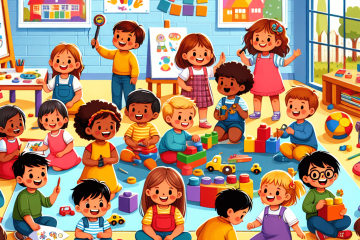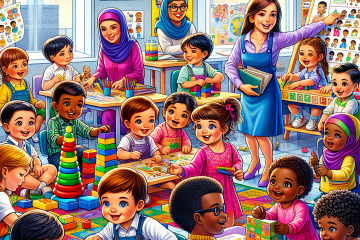“`html
How Play Schools Equip Children for Formal Education
The transitional phase from home to formal schooling is a crucial period in a child’s life. During this time, play schools or preschools become instrumental in preparing young minds for the structured learning environment of formal schools. Let’s delve into the myriad ways in which play schools lay a robust foundation for a child’s educational journey.
Fostering Social and Emotional Development
Play schools offer an environment where children interact with peers, lay the groundwork for vital social skills, and learn to manage emotions effectively. These formative years are critical for:
- Building Friendships: Kids learn how to make friends and understand the significance of friendships, which eases the transition into formal schooling.
- Sharing and Cooperation: Activities often involve sharing materials and cooperative play, fostering a sense of community and teamwork.
- Dealing with Emotions: Children encounter situations that teach them to manage anger, frustration, and happiness, thereby developing emotional intelligence.
Cognitive Skill Enhancement
Early childhood education focuses on cognitive development. Play schools introduce children to numbers, letters, and basic problem-solving techniques in a fun and engaging manner.
- Language Skills: Storytelling, singing, and conversations enhance vocabulary and communication skills.
- Numeracy Skills: Simple counting games and puzzles lay the foundation for mathematical understanding.
- Critical Thinking: Activities and games that require problem-solving help develop critical thinking and reasoning skills.
Structured Learning through Play
One of the unique aspects of play schools is the blend of play and structured learning. This approach ensures that children learn essential concepts without the formalities that might overwhelm them.
- Play-Based Curriculum: Lessons are often embedded within play, which keeps children engaged and makes learning enjoyable.
- Explorative Learning: Children are encouraged to explore their environment, ask questions, and develop a curiosity-driven mindset.
Physical Development
Physical activities are a cornerstone of preschool education. These activities are designed to enhance both fine and gross motor skills.
- Fine Motor Skills: Hand-eye coordination is improved through activities like drawing, cutting, and puzzle-solving.
- Gross Motor Skills: Physical games and outdoor play strengthen large muscle groups and promote overall fitness.
Incorporating Healthy Habits
Play schools also have a role in instilling healthy habits in children. From hygiene practices to healthy eating, these early lessons have a long-lasting impact.
- Hygiene: Simple routines like handwashing before meals become second nature.
- Nutrition: Snack times often include healthy options, teaching kids about balanced diets.
Preparation for a Structured Environment
Moving from a less structured home environment to a formal school setting can be a significant change for children. Play schools act as a preparatory stage, acclimatizing kids to a more organized setting.
- Routine and Discipline: Play schools introduce children to the concept of routines, helping them understand and follow schedules.
- Classroom Etiquette: Kids learn basic rules like raising hands to speak, listening to teachers, and respecting personal space.
Building Independence and Confidence
These early years are pivotal in building a child’s self-confidence and independence. Play schools encourage kids to take on simple responsibilities and make choices, which fosters a sense of autonomy.
- Simplicity in Independence: Simple tasks like tidying up toys or choosing their activities help children develop decision-making skills.
- Confidence Building: Successful completion of tasks and positive reinforcement boost a child’s self-esteem and confidence.
Conclusion
Play schools play an indispensable role in bridging the gap between home and formal schooling. By focusing on holistic development—social, emotional, cognitive, and physical—preschools lay the groundwork for a smooth transition into formal education. The nurturing environment of play schools not only prepares children academically but also molds them into well-rounded individuals ready to take on the challenges of the next educational phase.
As we continue to recognize the importance of early childhood education, it’s clear that play schools are not merely a precursor to formal schooling but an essential foundation for a child’s overall development.
“`




